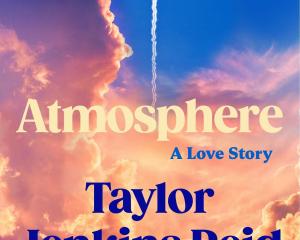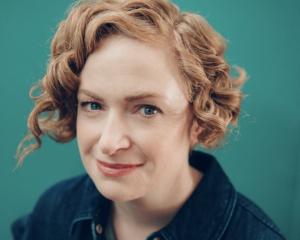
Having the potential to discover new writers and be the first to read work by top writers is really exciting, new Landfall editor Emma Neale says.
''I'm feeling in equal measures excited and terrified.''
Neale has taken over the reins from award-winning poet and critic David Eggleton, who had one of the longest tenures of any Landfall editor (2009-17).

Otago University Press publisher Rachel Scott said the role of Landfall editor was one that was at the heart of New Zealand arts and literature.
''Otago University Press is pleased to entrust this position to a writer and editor of such distinction and talent,'' she said.
Neale, who lives in Dunedin, feels the responsibility of taking on a role that has such a history, as the country's longest-running arts and literary journal, and an important part to play in New Zealand's literary scene.
''I was quite daunted by the weight of tradition in the magazine and knowing it's the type of job that can absorb your time; you can never know enough, you can't be an expert in everything.''
Having stepped into Eggleton's shoes, she is finding her feet and developing networks, appointing book reviewers and discovering their strengths.
There is already an entire shelf of books waiting to be assigned, despite Eggleton being ''incredibly efficient''.
The Landfall job also includes a visual arts portfolio, an area in which Neale is not so confident.
''I don't have nearly as much training in this field as the last two editors have had, so this is a great opportunity to learn more.''
When it comes to literary submissions, she is much more confident, given her background in fiction and non-fiction writing since about 2000.
She spent 10 years at Longacre Press as an in-house editor before going freelance and trying her hand at writing.
''I thought it was incredibly arrogant to think I could judge a book when you haven't written one, so I thought it would make me a better agent and promoter of other people's books if I understood the process more. I wasn't expecting to get published.''
Neale sent her transcript to her mother and stepfather, who are literary agents, for feedback. They said it needed some work but asked to be her agents.
''I sort of fell into it backwards.''
Neale (48) has since published six novels and five poetry collections, and has edited several anthologies.
She is a former Robert Burns fellow (2012) and has received numerous awards and grants for her writing, including the Janet Frame/NZSA Memorial Prize for Literature (2008), the University of Otago/Sir James Wallace Pah Residency (2014), and the Philip and Diane Beatson/NZSA Writing Fellow in 2015.
Neale was awarded the Kathleen Grattan Award for 2011 for her poetry collection The Truth Garden, and was a finalist for the Acorn Foundation Fiction Prize at the Ockham New Zealand Book Awards 2017 for her novel Billy Bird.
She has extensive experience as a literary editor and reviewer, and holds a PhD in New Zealand Literature from University College London (UK) (1999).
Her passion for literature came out of growing up in a household full of books with a novelist mother and a father, a doctor, who was a keen reader, she says.
''I carried on as an obsessive reader from very young.''
While she initially wanted an academic career, she decided to go into publishing instead.
''After my first foray into an academic career, I reversed rapidly into publishing.
''Which has been fairly precarious as big companies buy up small companies. It's had some wobbly times, but it's still where I feel most at home, so I've stuck to it.''
The deadline for her first Landfall journal is January 10, so there is a constant stream of submissions of poetry, essays and fiction.
''I hear it becomes a tsunami on the 10th. It's going to be a busy summer.''
Given she has only about 208 pages available twice a year, it is a very competitive process.
''Landfall has such a reputation, we get submissions from all over the world, even though it's meant to be for New Zealanders or people with clear connections to New Zealand or the Pacific.''
The journal has tried to follow changes in New Zealand itself.
''What I want to do is see what comes in and take the first year or two to get a sense of what the quality of submissions really is and work out what gaps there might be, because I think it's important to preserve its pre-eminent status as much as possible.
''I'm going to make cautious steps. I have one or two changes I could possibly make but it depends on resources and what is practical.''
It will be February when her first efforts as editor are visible as the online reviews come out before the hard copy.
Bringing in the online component 10 years ago meant reviews that there might not be space for in publications could still be read.
''It was a very clever innovation with a broader reach and has a surprisingly high hit rate on social media. It's extremely popular.''
Neale has been allocated 70 hours for each issue, but has already done twice that and ''I've only been in the position for a few weeks''.
''I'm building up networks and researching all sorts of subjects, which I don't have background in so I can select a reviewer.
''The books that come in are so eclectic and such a broad range.''
Selecting books to be reviewed and pieces to be published is one of the job's big challenges, she says.
''I'm really excited to read the submissions; the potential to discover new voices and to see some of our top writers at their peak.
''You have to focus on the piece of work and not the person [who wrote it] to ensure the work itself stands up. You have to be hard-nosed: I don't think I really understand how tough it is yet.''
Neale plans to continue making a concerted effort to include a diverse range of voices from different cultures and ages as well as a balance of male and female reviewers.
''I want to reflect as much of contemporary New Zealand as I can.
''David worked quite hard to get a balance of reviewers. It will be a balance over all issues and time.''
It will also be a juggle to ensure selections are not too South Island-heavy given her networks are in the South Island, where she has been based for the past 15 or 16 years.
She has been impressed by how passionate people are about Landfall and by the offers of assistance to find the right person with the right expertise for book reviews.
''It can be hard to find someone in a specialist area that doesn't already have some kind of involvement in the book. There is a fair amount of diplomacy that needs to be exercised as well.''
The community support has been ''really wonderful'', as have the University Press staff.
With much of the daily administration carried by University Press, she is able to concentrate on putting together the issues.
''Otherwise there would be too much for one person. The first two or three weeks it was a panic situation, but I'm going to be more disciplined.
''You could carry on researching 24 hours a day if you had the energy. It would be very easy to become obsessive.''
Along with editing Landfall, Neale is also writing another novel, which she committed to before the Landfall opportunity came up.
She has Creative New Zealand funding for the novel, the first draft of which needs to be completed by November next year.
''So I can't put it on the backburner. I have to try to keep moving that along.''
Neale has decided to put her freelance editing work on hold for now.
''I'll have to go back to it eventually for financial reasons. It's still going to be a patchwork existence. ''
Tucked in around that she is also supervising a PhD candidate, but sees that as helping develop her critical skills as well as feeding that creative drive.
''It does all feed in.''
Neale also has two children, aged 15 and 8, so aims to ''compress'' her various workloads into school hours. ''It's probably just as well.''
She believes she is the first woman with children to edit the magazine.
‘Landfall’ is...
- New Zealand’s longest-running arts and literary journal
- Published biannually by Otago University Press
- A place to showcase new fiction, poetry, biographical and critical essays, cultural commentary and visual arts
- Founded in 1947 by the Dunedin writer, critic and arts patron Charles Brasch











